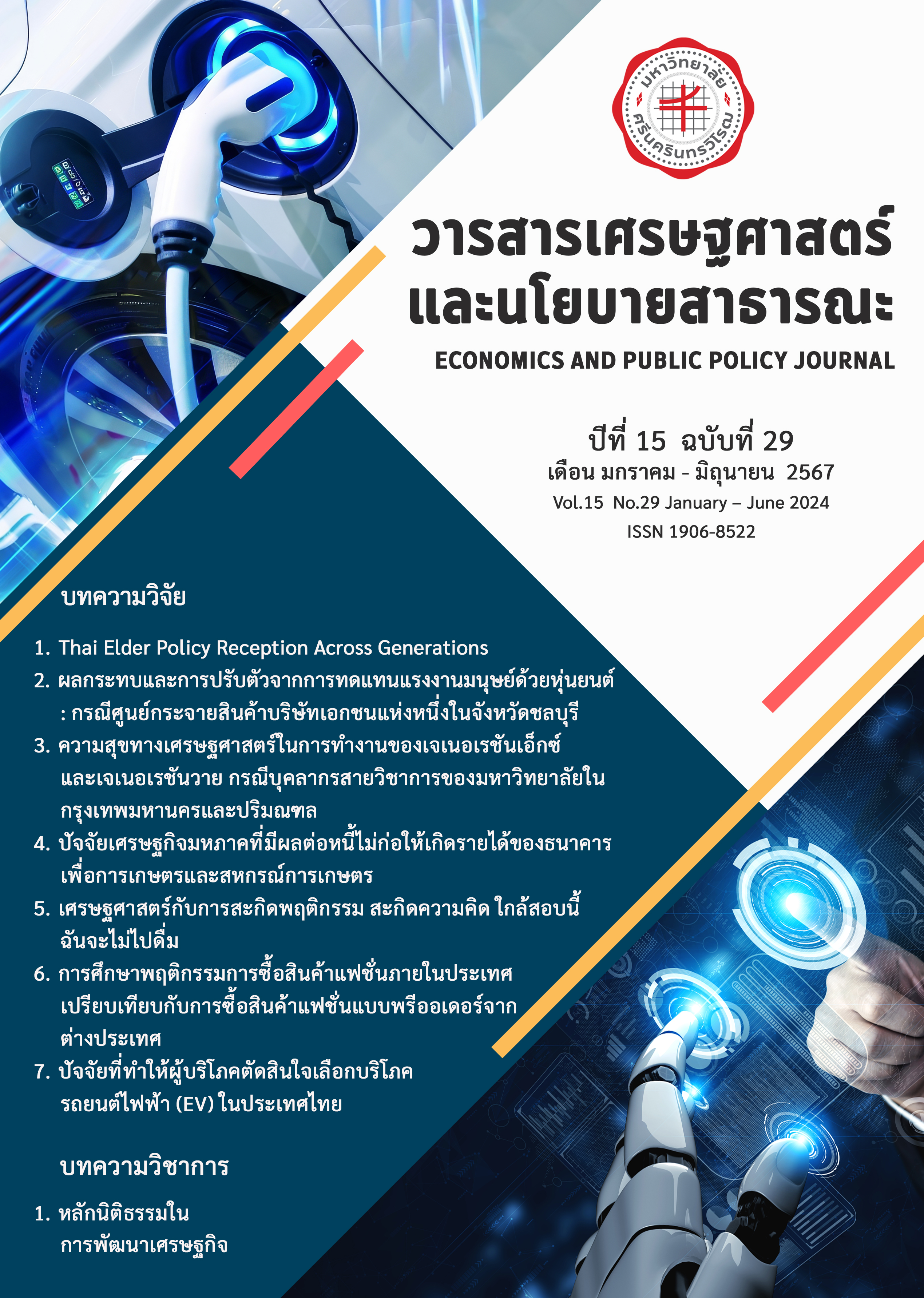Thai Elder Policy Reception Across Generations
Main Article Content
บทคัดย่อ
This study investigates how varying age groups perceive information regarding elder policies. Data was gathered from 1,000 residents of Bangkok, Thailand, segmented into age brackets: 21-30, 31-40, 41-50, and 51-60 years old. The research aims to discern if age disparities contribute to distinct attitudes towards elder policies. Findings reveal a trend where younger individuals exhibit lower interest in elder policies compared to older cohorts. Notably, a crucial observation highlights a lack of awareness among soon-to-retire individuals regarding elder policies, signaling a significant concern. Analysis indicates that the primary information source for elder policies across all age groups is television, superseding other mediums like the internet. However, when evaluating comprehension channels, the ratio between television and internet use changes. Additionally, employing an econometric model, the study examines variables impacting post-retirement worries, with factors such as income, education, interest in elder policies, time allocation for policy understanding, marital status, having children, and gender demonstrating statistical significance across all age groups. These findings underscore the significance of these variables in influencing concerns about life after retirement among the Thai population.
Article Details

อนุญาตภายใต้เงื่อนไข Creative Commons Attribution-NonCommercial-NoDerivatives 4.0 International License.
สงวนลิขสิทธิ์ © 2553 คณะเศรษฐศาสตร์ มหาวิทยาลัยศรีนครินทรวิโรฒ
คณะเศรษฐศาสตร์ มหาวิทยาลัยศรีนครินทรวิโรฒ จัดพิมพ์วารสารเศรษฐศาสตร์และนโยบายสาธารณะ เพื่อเผยแพร่บทความวิชาการทางเศรษฐศาสตร์ นโยบายสารธารณะ และสาขาอื่นๆที่เกี่ยวข้อง ทัศนะและข้อคิดเห็นใดๆ ที่ปรากฏในวารสารเป็นความคิดเห็นส่วนตัวของผู้เขียน โดยบทความที่ได้รับการตอบรับจะถือเป็นลิขสิทธิ์ของคณะเศรษฐศาสตร์ มหาวิทยาลัยศรีนครินทรวิโรฒ
บรรณาธิการ อาจารย์ ดร.พลพัธน์ โคตรจรัส
เอกสารอ้างอิง
Ekachai, S. (2023). Outrage over old-age allowance cut. Retrieved from https://www.bangkokpost.com/opinion/opinion/2634277/
outrage-over-old-age-allowance-cut.
Bank of Ayudhya. (n.d.). 62% of Thais plan to retire wrongly Are you ready?. Retrieved from https://www.krungsri.com/bank/th/
planyourmoney/must-stories/life-plan/retirement-failure-solution.html
Chaiyawong, A., & Lueprapai, S. (2011). Expenditure Analysis of Benefits Welfare for the Elderly. Local Administration Journal, 4(1), 24–
Retrieved from https://www.tci-thaijo.org/index.php/colakkujournals/article/view/88332
Jitapunkul, S., Bunnag, S., & Ebrahim, S. (1993). Health Care for Elderly People in Developing Countries: A Case Study of Thailand. Age
and Ageing, 22(5), 377-381. Retrieved from https://academic.oup.com/ageing/article-abstract/22/5/377/35465?
redirectedFrom=fulltext
Kumsuchat, S. (2017). Health Problems and Health Care Needs among Thai Elderly: Policy Recommendations. Journal of Health Science,
(6), 1156–1164. Retrieved from https://thaidj.org/index.php/JHS/article/view/1363
Narknisorn, B., & Kusakabe, K. (2013). Issues challenging future Thai elder care by women and family. International Journal of Sociology
and Social Policy, 33(1), 21-32. Retrieved from https://www.emerald.com/insight/content/doi/10.1108/01443331311295154/
full/html
National Statistical Office Ministry of Information and Communication Technology. (2014). The 2014 Survey of the Older Persons in
Thailand. Retrieved from http://service.nso.go.th/nso/nsopublish/themes/files/elderlyworkFullReport57-1.pdf
National Statistical Office Thailand. (2016). Household Expenditure and Household Income. Retrieved from http://www.nso.go.th
National Statistical Office Thailand. (2018). Household Expenditure and Household Income. Retrieved from http://www.nso.go.th
National Statistical Office Thailand. (2018). Household Expenditure from 2009 to 2018. Retrieved from http://www.nso.go.th
National Statistical Office Thailand. (2021). Population from registration classified by age group Regions and Provinces 2012 – 2021.
Retrieved from http://www.nso.go.th
Statista Research Department. (2019). Share of aging population Thailand 2015-2035. Retrieved from
https://www.statista.com/statistics/713667/thailand-forecast-aging-population/
Sukpaiboonwat, S. (2021). International Conference on Economics, Management & Technology 2019. In Bridging Entrepreneurship and
Social Innovations. Neu-Ulm. Retrieved from https://books.google.co.kr/books?hl=th&lr=&id=9rE6EAAAQBAJ
&i=fnd&pg=PA121&dq=Thai+elderly+policy&ots=1P6vUco8lm&sig=1DxJ-VW5vx_lXPiat0ceBrkh8Zg
&redir_esc=y#v=onepage&q=Thai%20elderly%20policy&f=false
Tonam, B., Posing, P., & Krittiyachot, C. (2018). The policy implementation of cash allowance for the elderly. Sisaket Rajabhat University
Journal, 12(3), 149–158. Retrieved from https://so05.tci-thaijo.org/index.php/sskrujournal/article/download/149108/109522/
University of Florida. (1992). Determining Sample Size. Retrieved from https://www.tarleton.edu/academicassessment/documents/
samplesize.pdf
Vorasiha, P. (2018). Life After Retirement: Experiences of Elders in Thailand. Research and Development Journal Suan Sunandha
Rajabhat University, 10(1), 201-215. Retrieved from https://www.tci-thaijo.org/index.php/irdssru/article/view/133224
World Bank. (n.d.). Population ages 65 and above (% of total population). Retrieved from https://data.worldbank.org/indicator/
SP.POP.65UP.TO.ZS


